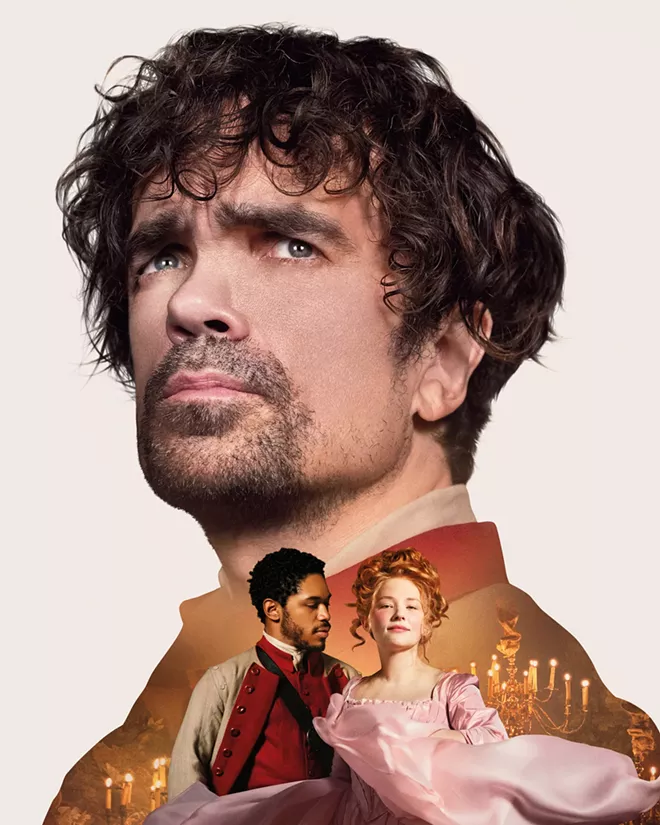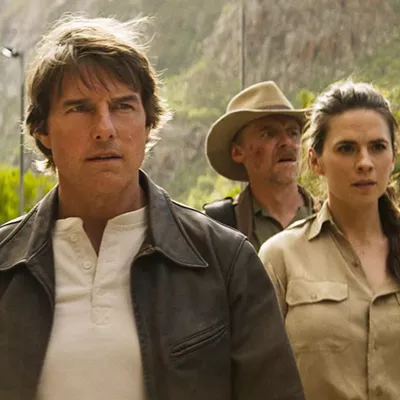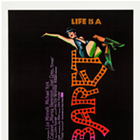There's a scene early in Cyrano, a musical adaptation of the classic 1897 stage play, in which the titular wordsmith is advising a baker and wannabe poet on how to choose his literary metaphors. The baker is struggling with making something about stars and constellations work, and Cyrano gently suggests that an analogy closer to home might be more apt. You know, the fleshiness of dough, the sensuality of kneading, the warmth and visceral pleasure of fresh bread.
"Aha!" the baker enthuses. The music swells and the camera swoops in to big bowls of plump dough being worked over by sexily floured hands, fingers teasing and squeezing... and it's all faintly icky, yearning for earnestness but ineptly falling into parody. It's not emblematic of everything that's wrong with Cyrano, but it hits many of those discordant notes.
The idea of this movie is better than the movie itself.
Peter Dinklage — one of the finest actors working today — as soulful and eloquent Cyrano de Bergerac, minus the big nose but still lacking in confidence when it comes to admitting his feelings to the woman he adores? Love it. And he can sing! He gets to do some sword fighting! But way too much is missing that is absolutely required to make this work. The big one: We need to believe that that woman he longs for is worthy of his devotion. And there's nothing here to convince us of that.
Roxanne (Haley Bennett) is very pretty, but she comes across as stupid and shallow, at best. How can she sincerely believe that she has fallen in love with a handsome soldier, Christian (Kelvin Harrison Jr.), merely by catching a glimpse of him across a crowded public space? How can she maintain her self-delusion when the awkward, clumsy words that come out of his mouth when she finally does speak with him do not match — not even remotely — the smooth, charming poetry of his letters... which were, of course, written by Cyrano, expressing his own passion for Roxanne? How does she not know her smitten correspondent is Cyrano himself, when he takes over from Christian to woo her, from a hiding place, at her balcony one night? She's known Cyrano since she was a child! She knows his voice!
There's only one explanation: She's an idiot.
This is not romantic, unless in the most depressing, most tragic interpretation of the word. There's no humor, no absurdity in this take on one of literature's great thwarted lovers, just misery and pain. (I now long to rewatch the 1987 utterly delightful romantic comedy Roxanne, starring Steve Martin and Daryl Hannah). I don't think we're intended to take this as so dark. There are touches of fairy-tale fantasy — Ben Mendelsohn as the absolutely vile nobleman after Roxanne is close to pantomime camp. And there is glorious color and light in the Sicilian locations; the beautiful cinematography is by Seamus McGarvey, who also shot the magical The Greatest Showman and 2012's audaciously stylized Anna Karenina.
That Anna Karenina was from director Joe Wright, as Cyrano is, and I'm afraid this is but another baffling misstep from the filmmaker. He started out making daring, enrapturing films such as Atonement, but lately has fumbled through Darkest Hour, which is nothing but Gary Oldman stomping around in a Winston Churchill suit, and the disastrous Pan, an embarrassingly empty pastiche of beloved action blockbusters.
I'm tempted to wonder if perhaps it all works better onstage; this is based on the off-Broadway play by Erica Schmidt. (She is married to Peter Dinklage, and they both say the role was not written with him in mind.) But the music, also ported over from the play and written by the band The National, is downbeat at best, and often harsh and jarring. The unpleasantness of Cyrano is as puzzling as it is inescapable. ♦

























